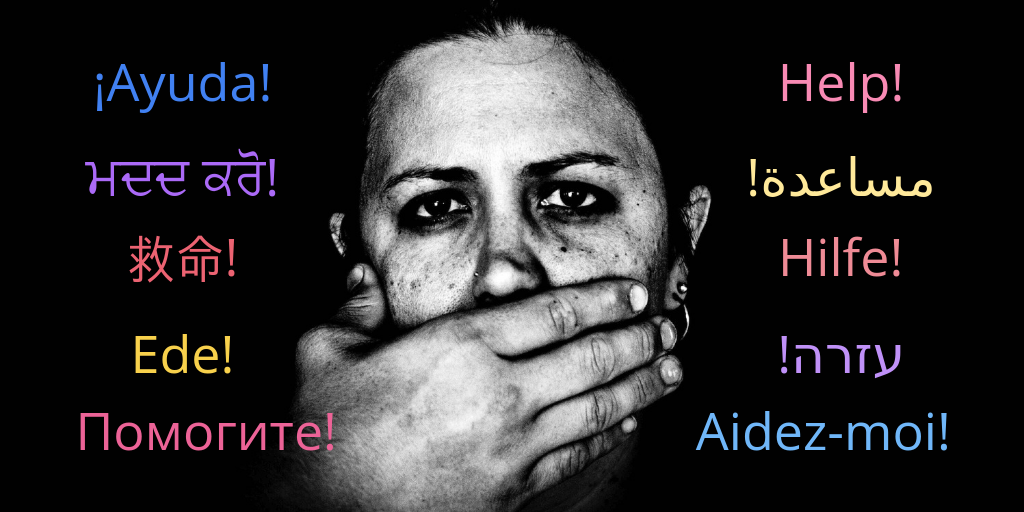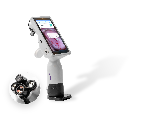
Accessing any type of health service in the US can be difficult when English is not your first language. Now imagine trying to find the words to express yourself after you have been a victim of sexual assault. The impact of such a traumatic experience can leave anyone at a reduced capacity to communicate, let alone having to explain such an intimate attack in a language that is foreign.
Lack of qualified interpreters
The unfortunate truth is that non-English speaking victims in the US have a harder time accessing forensic exams than their English speaking counterparts. Part of this results from a lack of familiarity with the criminal justice system, the healthcare system, or the process of completing a sexual assault forensic exam in America. The rest can be attributed to a lack of access to qualified interpreters or bilingual medical professionals.
Beyond the fact that having a forensic interview and exam in the patient’s own language provides a more victim-centered approach, lack of a qualified or properly matched interpreter can also have serious implications down the road. Jessie Boye-Doe, LCSW, who is currently the Director of JCCA’s Center for Healing in NY, has extensive experience both as a sexual assault victim advocate and in child advocacy.
Boye-Doe recalls a case in which a survivor received an interpreter in her language but not in her dialect. “Situations like this can be a really terrible experience for a victim. A survivor may be excited that they will finally have someone to understand them and share their story more clearly, only to be let down. It has the potential to severely impact the services that they receive,” says Boye-Doe.
Some languages, such as Arabic and French, can vary quite drastically between dialects. “The version of Arabic spoken most often in Morocco is not the same Arabic spoken in Saudi Arabia or Syria. And likewise, just because Creole is a derivative of French, doesn’t mean that a French interpreter will be able to accurately translate for a Creole speaker.” Boye-Doe continues, “As service providers, we need to make sure that we are matching interpreters, not only by language but also by region and dialect.”
Using unqualified interpreters can lead to inconsistencies in the victim narrative which can negatively impact arrest and trial. When friends or family interpret, it can also compromise survivor safety and confidentiality. Victims may not feel as comfortable to share all details for fear of judgment or having their experience publicized among their peers without consent. If a member of law enforcement translates, the victim may also feel more pressured to proceed with formal charges.
According to A National Protocol for Sexual Assault Medical Forensic Examinations, providing a victim-centered approach requires putting a patient’s needs before and during the information gathering process. If during the initial assessment it is determined that an interpreter is necessary, one “should be present prior to questioning and there should be space from them in the exam room and other rooms where information is gathered.” (DOJ, 2013, p. 88)
Finding solutions
Live interpretation is best, but when it is not available, you can use a service such as Language Line which provides 24/7 translation over the telephone in a wide variety of languages. For Deaf and Hard of Hearing survivors, you will want to have a video relay service in place for American Sign Language (ASL) interpretation. In this service, the victim will use sign language with an interpreter over a secure video chat. However, check that the Deaf or Hard of Hearing survivor speaks ASL and not sign language from another country since they differ. You may also need to assess whether or not they use home sign, a less formal and gesture-based sign language that could cause issues in interpretation.
In order to build a reliable pool of translators, Boye-Doe recommends building relationships with other community-based programs and NGOs.
“Partnering with local agencies that specialize in working with non-English-speaking and immigrant communities helps you get more accurate translators to work with your survivors. It also does wonders for community building and accessing other necessary resources that a survivor may need on their path to healing.”
Working with organizations that cater to immigrant communities also helps to break down some of the discrimination or hostilities that survivors may face from other less culturally competent direct service providers. By reducing some of the language and cultural barriers, it can help reduce the fear that may prevent survivors from seeking help from healthcare providers or law enforcement.
Whether new to forensic nursing or not, we all know that even with the best planning and community building it might not help too much when you get that call from the ER for an exam at three o’clock in the morning. Boye-Doe notes that SANEs and other service providers can feel intimidated by a language barrier. “Language and accents are huge roadblocks for people, but you can usually find a way to work around this by being flexible.”
Some recommendations
While there are many considerations for quality translation, it is important to take into account the gender of the interpreter and how much English, if any, the victim understands. “While many victims may feel comfortable to have someone in the exam room speaking their language, in instances where the only available interpreter was a male with a female victim, we worked around it by having the interpreter standing near the door or actually being on speaker phone while the forensic exam was being performed,” says Boye-Doe.
Even if the survivor appears to speak or understand English, language issues can still exist. “Be mindful that although you may be communicating with an immigrant survivor in English, they may not actually comprehend it on the level you think they do,” Boye-Doe explains. “Be sure to ask open-ended questions and avoid close-ended questions. Open-ended questions will prevent you from leading the narrative and clue you into someone’s level of understanding of English since it is much more difficult to provide ‘yes’ or ‘no’ answers.”
If you do encounter a survivor that doesn’t speak English, remember that there are other ways to communicate, at least in the short term. In recounting her experience training to be a volunteer sexual assault advocate at Mount Sinai Hospital in NYC, Boye-Doe details the experience of having to role play as a victim who didn’t speak English with her fellow volunteers:
“I performed the role play as a non-English speaking victim, speaking in Ga [ a language spoken in Southeastern Ghana]. I was using hand signals and very vivid gestures towards my body which I felt were fairly obvious, but the person playing the advocate was so stuck on trying to understand my words that they didn’t even make an attempt to interpret my hand gestures.”
While you may not be in the position to perform a forensic exam without an interpreter, you can still pick up on cues from body language and facial expressions that can help the survivor feel more at ease until help arrives in their language. Knowing the resources available in your local community and amongst fellow SANEs and victim advocates can go along way to making sure that whoever arrives to your clinic or ER will be able to share their story clearly.








